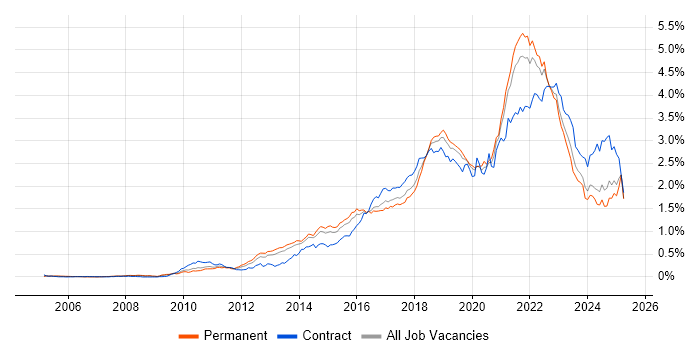Product Ownership
England > South East
The table below looks at the prevalence of the term Product Ownership in permanent job vacancies in the South East. Included is a benchmarking guide to the salaries offered in vacancies that cited Product Ownership over the 6 months leading up to 4 March 2026, comparing them to the same period in the previous two years.
| 6 months to 4 Mar 2026 |
Same period 2025 | Same period 2024 | |
|---|---|---|---|
| Rank | 159 | 134 | 156 |
| Rank change year-on-year | -25 | +22 | -77 |
| Permanent jobs citing Product Ownership | 131 | 138 | 222 |
| As % of all permanent jobs in the South East | 1.10% | 1.85% | 1.68% |
| As % of the Miscellaneous category | 3.90% | 5.59% | 5.05% |
| Number of salaries quoted | 74 | 87 | 136 |
| 10th Percentile | £50,375 | £47,500 | £42,500 |
| 25th Percentile | £63,125 | £52,500 | £48,690 |
| Median annual salary (50th Percentile) | £75,000 | £65,000 | £65,000 |
| Median % change year-on-year | +15.38% | - | +8.33% |
| 75th Percentile | £86,563 | £72,500 | £73,750 |
| 90th Percentile | £96,750 | £90,250 | £78,125 |
| England median annual salary | £70,000 | £70,000 | £63,500 |
| % change year-on-year | - | +10.24% | -5.93% |
All Generic Skills
South East
Product Ownership falls under the General and Transferable Skills category. For comparison with the information above, the following table provides summary statistics for all permanent job vacancies requiring generic IT skills in the South East.
| Permanent vacancies with a requirement for generic IT skills | 3,357 | 2,469 | 4,396 |
| As % of all permanent jobs advertised in the South East | 28.25% | 33.19% | 33.32% |
| Number of salaries quoted | 1,767 | 1,141 | 3,053 |
| 10th Percentile | £27,500 | £31,500 | £26,250 |
| 25th Percentile | £33,250 | £41,250 | £35,000 |
| Median annual salary (50th Percentile) | £50,000 | £56,000 | £50,000 |
| Median % change year-on-year | -10.71% | +12.00% | -9.09% |
| 75th Percentile | £65,000 | £68,750 | £63,750 |
| 90th Percentile | £77,700 | £85,000 | £77,500 |
| England median annual salary | £55,200 | £62,500 | £55,000 |
| % change year-on-year | -11.68% | +13.64% | -15.38% |
Product Ownership
Job Vacancy Trend in the South East
Historical trend showing the proportion of permanent IT job postings citing Product Ownership relative to all permanent IT jobs advertised in the South East.

Product Ownership
Salary Trend in the South East
Salary distribution trend for jobs in the South East citing Product Ownership.

Product Ownership
Salary Histogram in the South East
Salary distribution for jobs citing Product Ownership in the South East over the 6 months to 4 March 2026.
Product Ownership
Job Locations in the South East
The table below looks at the demand and provides a guide to the median salaries quoted in IT jobs citing Product Ownership within the South East region over the 6 months to 4 March 2026. The 'Rank Change' column provides an indication of the change in demand within each location based on the same 6 month period last year.
| Location | Rank Change on Same Period Last Year |
Matching Permanent IT Job Ads |
Median Salary Past 6 Months |
Median Salary % Change on Same Period Last Year |
Live Jobs |
|---|---|---|---|---|---|
| Thames Valley | -14 | 57 | £55,000 | -21.43% | 40 |
| Buckinghamshire | +14 | 31 | £52,500 | -26.06% | 13 |
| Berkshire | -16 | 21 | £63,000 | +0.40% | 24 |
| Hampshire | +1 | 20 | £90,000 | +57.89% | 16 |
| Kent | -5 | 15 | £75,000 | - | 10 |
| East Sussex | -4 | 14 | £80,000 | +60.00% | 4 |
| West Sussex | 0 | 13 | £65,000 | -13.33% | 4 |
| Surrey | -39 | 8 | £70,000 | +7.69% | 12 |
| Oxfordshire | -9 | 5 | £87,500 | +25.00% | 7 |
| Product Ownership England |
|||||
Product Ownership
Co-Occurring Skills & Capabilities in the South East by Category
The following tables expand on the one above by listing co-occurrences grouped by category. They cover the same employment type, locality and period, with up to 20 co-occurrences shown in each category:
|
|
||||||||||||||||||||||||||||||||||||||||||||||||||||||||||||||||||||||||||||||||||||||||||||||||||||||||||||||||||||||||||||||
|
|
||||||||||||||||||||||||||||||||||||||||||||||||||||||||||||||||||||||||||||||||||||||||||||||||||||||||||||||||||||||||||||||
|
|
||||||||||||||||||||||||||||||||||||||||||||||||||||||||||||||||||||||||||||||||||||||||||||||||||||||||||||||||||||||||||||||
|
|
||||||||||||||||||||||||||||||||||||||||||||||||||||||||||||||||||||||||||||||||||||||||||||||||||||||||||||||||||||||||||||||
|
|
||||||||||||||||||||||||||||||||||||||||||||||||||||||||||||||||||||||||||||||||||||||||||||||||||||||||||||||||||||||||||||||
|
|
||||||||||||||||||||||||||||||||||||||||||||||||||||||||||||||||||||||||||||||||||||||||||||||||||||||||||||||||||||||||||||||
|
|
||||||||||||||||||||||||||||||||||||||||||||||||||||||||||||||||||||||||||||||||||||||||||||||||||||||||||||||||||||||||||||||
|
|
||||||||||||||||||||||||||||||||||||||||||||||||||||||||||||||||||||||||||||||||||||||||||||||||||||||||||||||||||||||||||||||
|
|
||||||||||||||||||||||||||||||||||||||||||||||||||||||||||||||||||||||||||||||||||||||||||||||||||||||||||||||||||||||||||||||
|
|||||||||||||||||||||||||||||||||||||||||||||||||||||||||||||||||||||||||||||||||||||||||||||||||||||||||||||||||||||||||||||||
